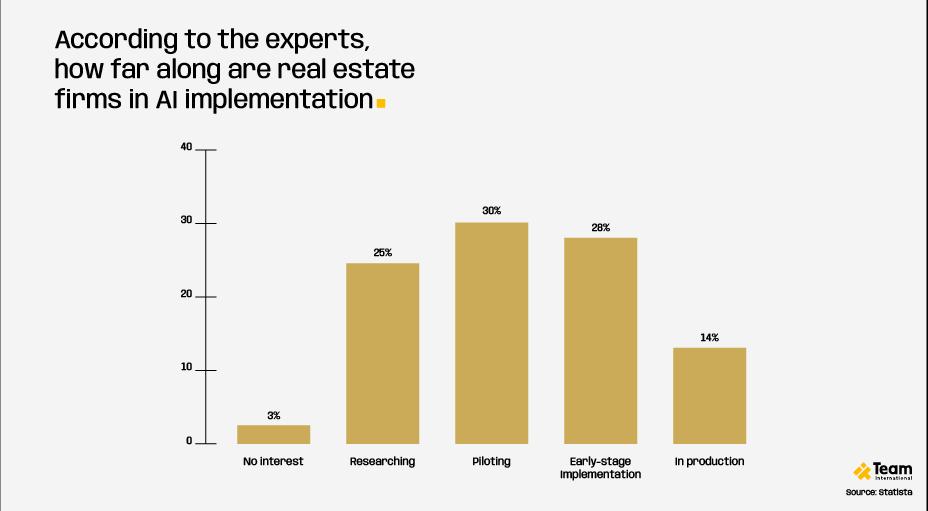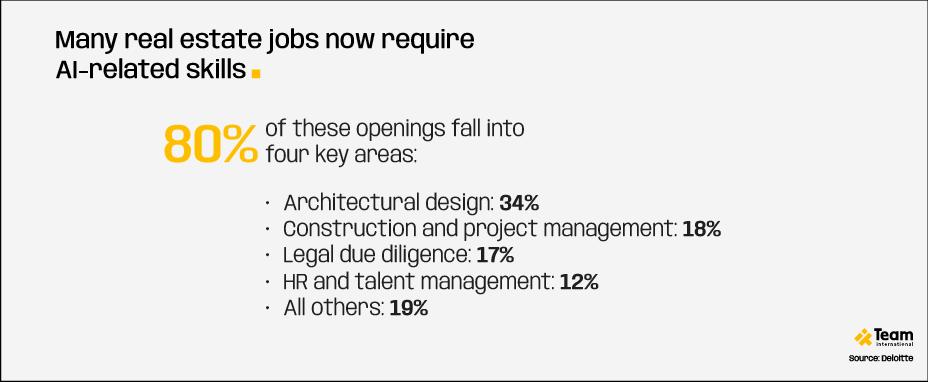Historically slow to adopt new technologies, the real estate industry stands at a crossroads. It can either embrace the challenge put forth by next-gen innovations like generative AI or stick to what it knows. According to McKinsey, there are about 110 billion reasons why they should plow forward and embark on the tough but necessary journey of digital transformation.
The last stop in it would be the revolutionary implementations that Gen AI has now made possible. It is truly a transformative force, able to create value in the way properties are developed, marketed, managed, and much more. Cognizant of this great opportunity, the real estate industry is taking its first steps towards that brighter future.
Ready to learn how an entire sector reinvents itself? AI in the real estate industry is here, and we can’t wait to see where it goes. Let’s investigate the changes happening in the sector, how they’re coming about, and what that future is likely to hold.

The four capabilities driving Gen AI adoption in real estate
To understand how generative artificial intelligence fuels change in the sector, one has to understand the range of AI real estate solutions. However, to comprehend the use cases, it’s essential to navigate 110 billion reasons—the actual things it can do and how they align with the industry’s needs.
Let’s break them down into four categories:
#1 Customer engagement
Gen AI powers sophisticated chatbots and virtual assistants that can handle complex property inquiries, schedule viewings, and provide detailed information about properties and sites 24/7. These systems learn from each interaction, continuously improving their ability to serve both potential and existing clients while at the same time freeing up massive amounts of resources to be allocated elsewhere.
#2 Content creation
From estate descriptions to marketing and sales materials intelligent automation tools can generate compelling content that highlights property features and appeals to target demographics. This includes the ability to create virtual staging and property visualizations that help potential buyers or tenants envision spaces. And it’s one of the primary hurdles companies look to overcome when potential buyers find themselves in distant places.
#3 Data analysis
The real estate industry generates enourmous amounts of unstructured data. Gen AI excels at synthesizing insights from sources such as lease documents, market reports, and property performance data, making it possible to identify trends and opportunities that might otherwise go unnoticed. The real revolution here lies in the transition from analytical AI, which has been with us for some time, to predictive analytics.
#4 Coding solutions
Gen AI can assist in developing and maintaining property management systems, creating custom applications for specific industry needs, and automating routine technical tasks that previously required significant development resources.
AI real estate software can accelerate the digitalization of operations that would traditionally be handled by purely physical means. In terms of accessibility, it’s a genuine game-changer that will enable a true democratization of the real estate market.
How real estate uses Gen AI today
Now, how about actual projects that real estate companies turn to in their attempts to harvest Gen AI’s capabilities? There is, of course, a massive amount of variety here, as certain firms are more innovative and farther along in their digital transformation efforts than others. However, we can usually identify a common set of projects thar are less demanding in their AI capabilities and have a high success rate. Most organizations turn to these projects in their first efforts. Beyond that are high-impact but risky projects most firms shy away from.
Intelligent document processing and lease analysis
Gen AI systems can process thousands of lease documents in minutes. It’s important to understand, though, that this has been possible for a long time now through analytical artificial intelligence. Gen AI’s added twist is the ability to generate meaningful output based on its analysis of these inputs.
For instance, generative AI can analyze key terms, identify potential factors that can affect leases, and summarize this critical information in a way that’s helpful for companies’ databases. This capability allows real estate professionals to focus on strategic decision-making rather than document review and even engage in AI real estate lead generation. Need to identify all leases with specific clauses or compile rent escalation schedules across an entire portfolio? No sweat! Gen AI has got your back.
AI-powered real estate interactions
Let’s face it. Real estate interactions are far from simple. Mortgages, dealing with landlords, understanding building requirements... these are not simple things. Luckily, using an AI-powered copilot, consumers can now query artificial intelligence systems to better understand these tasks and also solve them.
Advanced AI copilots revolutionize property management by handling routine tenant requests, managing maintenance schedules, and even assisting in lease negotiations. These systems can monitor conversations at scale, provide coaching to property management teams, and ensure consistent communication while flagging high-risk situations for human attention. Talk about a quality-of-life boost!
Data-driven investment decisions
Farther up the implementation ladder is the use of Gen AI to analyze disparate data sources and generate a range of compelling investment options. That’s right! These AI tools for real estate investors parse complex data from market trends, demographics, and property performance metrics to identify promising investment opportunities.
Furthermore, the speed at which these systems can analyze data and generate recommendations is staggering. Indeed, real estate groups that lag in implementing these solutions find themselves at great risk. Of course, there is always a need for human oversight, especially when finances are involved, but analysts who have the support of Gen AI systems will likely outperform those who don't.
Visualization and revenue generation
Generative artificial intelligence tools can transform empty spaces into fully furnished environments, allowing prospects to visualize different design options and configurations. No more wondering what an empty apartment would look like when decorated. You can now pick your ideal furnishings and transform any living room through user-friendly interfaces in real-time.
But wait... this capability extends far beyond visualization to create new revenue streams through partnerships with furniture retailers and service providers, enabling seamless "click-to-buy" experiences for visualized items. The eventual incorporation of AR and VR technology into these customer experience offerings is even more mind-blowing. You won’t look at your dream apartment through a screen. You’ll physically walk through it, perfectly understanding its proportions and ambiance.
AI-assisted architectural planning
The holy grail of Gen AI implementations in real estate is the creation of solutions that can engage in architectural planning. Yes, by analyzing data from IoT sensors and computer vision systems, Gen AI can help optimize building designs for specific outcomes. This includes understanding how people use spaces, optimizing traffic flow and designing environments that enhance productivity and sales performance.
Gen AI could, for example, analyze foot traffic in a theme park and work to create spaces that are less crowded, leading to shorter lines at major attractions. It could even assess changes in daylight and set up an office plan that maximizes exposure to natural sunlight! This implementation is all about generating architectural plans based on successful patterns while leaving room for human creativity in the final design.

Technical requirements and strategic roadmaps
For real estate organizations embarking on their generative AI journey, success hinges on more than just selecting the right artificial intelligence tools. There must be a clear business strategy supported by a continually updated tech strategy—one that is not afraid to look out into the innovation landscape and reassess its assumptions. Furthermore, when it comes to implementation, you must support efforts with a logical organizational model and a suitable enterprise architecture. When these elements come together, that’s when AI integration truly shines!
As AI experts, we recommend that business owners start with high-impact, low-risk use cases that can demonstrate value quickly while building organizational confidence. Consider implementing a proof-of-concept approach with two parallel tracks: quick wins that can show immediate ROI and longer-term transformational projects that could fundamentally reshape your business model. The more synergies you can create the better!
Also, security and compliance cannot be afterthoughts. As AI systems become more deeply integrated into real estate operations, companies must develop comprehensive frameworks for data privacy, fair housing compliance, and ethical AI usage. This includes establishing clear guidelines for AI decision-making and maintaining human oversight of critical processes. No one wants to think their property is gathering data at their expense. Be clear with your organization’s members and those whom you are looking to serve.
Looking ahead, the real estate operators that will thrive are those that view generative AI not just as a tool but as the ultimate crowning jewel on the long road toward comprehensive digital transformation. This means investing in both IT infrastructure and talent development, creating cross-functional teams that can bridge the gap between real estate expertise and technological innovation.
The window for gaining a competitive advantage through early AI adoption is closing rapidly. Organizations that move decisively now—building robust technical foundations while maintaining a clear focus on strategic objectives—will be best positioned to lead the industry's transformation in the years ahead. The question is no longer whether to embrace AI but how quickly and effectively you can leverage it to transform your operations and create new value for your stakeholders.





